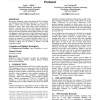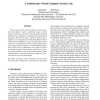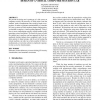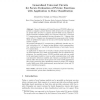150 search results - page 17 / 30 » Fair Secure Two-Party Computation |
NOSSDAV
2009
Springer
14 years 2 months ago
2009
Springer
Peer-to-peer distributed virtual environments (DVE's) distribute state tracking and state transitions. Many DVE's - such as online games - require ways to fairly determi...
AINA
2006
IEEE
14 years 1 months ago
2006
IEEE
Intelligent security protocols can verify whether the involved principals have properties that are defined based on certain functional and security policies. The property we focu...
ESCIENCE
2006
IEEE
13 years 11 months ago
2006
IEEE
The necessity of a lab course on computer security arises from the students' need to complement course work by hands-on experience. In order to meet the distance teaching dem...
CNIS
2006
13 years 9 months ago
2006
We present the design and a prototype of a lab course on computer security, the necessity of which arises from the students' need to complement course work by hands-on experi...
ICISC
2008
13 years 9 months ago
2008
Secure Evaluation of Private Functions (PF-SFE) allows two parties to compute a private function which is known by one party only on private data of both. It is known that PF-SFE c...




